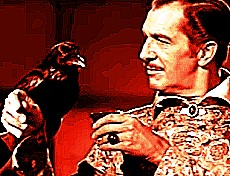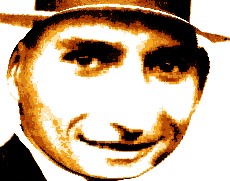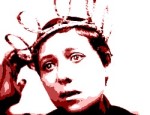Film Review

Joining Corman stalwart Vincent Price in this fun-filled fright fest are two of Hollywood's best-loved horror icons, Peter Lorre and Boris Karloff. Looking like a crowded three-man lunatic asylum, these three masters of Grand Guignol are clearly having the time of their lives, out-camping each other with such relish that you wonder how they were ever able to resume their separate careers afterwards. This comedy threesome takes some beating, which is probably why no one noticed the handsome supporting artiste skulking in the background. Just what did happen to Jack Nicholson?
No one could describe Vincent Price as the most subtle practitioner of the histrionic art but here he surpasses himself, with a show of undiluted camp extravagance that will reduce any audience to hysterics - not that Matheson's dialogue was ever likely to encourage a naturalistic performance. Lorre is enjoying himself far too much to be as funny as Price (except when he is voicing the raven) whilst Karloff, with his graveyard presence and deadpan delivery, somehow manages to outstage his co-stars with next to no effort. Seriously, you could die laughing...
© James Travers 2010
The above content is owned by frenchfilms.org and must not be copied.
Film Synopsis
Living alone in his ancient castle with his daughter Estelle, the sorcerer Dr Erasmus Craven continues to mourn the death of his beloved wife Lenore, who died two years ago. One evening, Craven's ritual grieving is disturbed by a raven who cheekily demands to be given a magic potion. With nothing better to do, Craven sneaks off to his well-stocked laboratory and concocts a foul brew, under the raven's instructions. This potion restores the raven to his true form, that of a rival sorcerer, Dr Bedlo. The latter explains that he was transformed into a bird during an argument with Dr Scarabus, an evil magician with a bad temper and absolutely no sense of humour. When Bedlo lets slip that he saw Lonore at Scarabus's castle, Craven instantly resolves to go there, believing that Scarabus has stolen his wife's spirit. Accompanied by his daughter, Bedlo and Bedlo's son Rexford, Craven pays Scarabus a night time visit and is surprised to be greeted cordially, as though he were an old friend. Little does Craven know that he has walked into a trap, carefully lain by Scarabus in an attempt to steal the secrets of his black art...© James Travers
The above content is owned by frenchfilms.org and must not be copied.
Similar Films
Here are some other films you may enjoy watching:- Tendre Dracula (1974)
- The Little Shop of Horrors (1960)
- Histoires extraordinaires (1949)
- Delicatessen (1991)
- Le Voyage imaginaire (1926)
Other related links:
Film Credits
- Director: Roger Corman
- Script: Richard Matheson, Edgar Allan Poe (poem)
- Cinematographer: Floyd Crosby
- Music: Les Baxter
- Cast: Vincent Price (Dr. Erasmus Craven), Peter Lorre (Dr. Adolphus Bedlo), Boris Karloff (Dr. Scarabus), Hazel Court (Lenore Craven), Olive Sturgess (Estelle Craven), Jack Nicholson (Rexford Bedlo), Connie Wallace (Maid), William Baskin (Grimes (Craven's servant)), Aaron Saxon (Gort), John Dierkes (Roderick Craven)
- Country: USA
- Language: English
- Support: Color
- Runtime: 86 min
The brighter side of Franz Kafka

The best French Films of the 1920s

The silent era of French cinema
